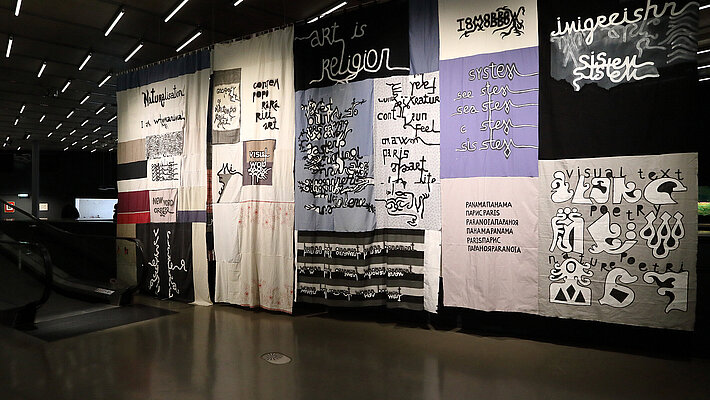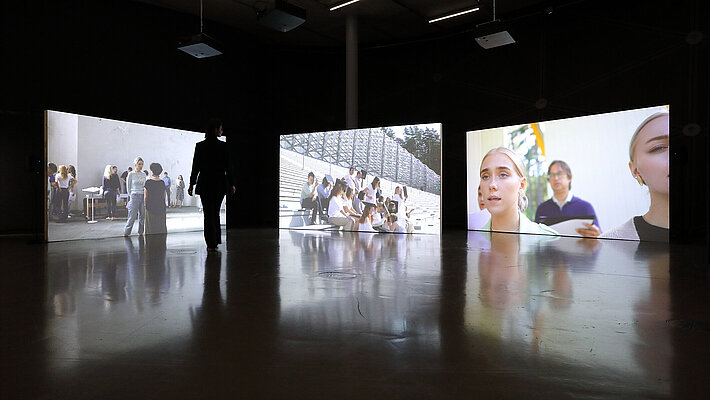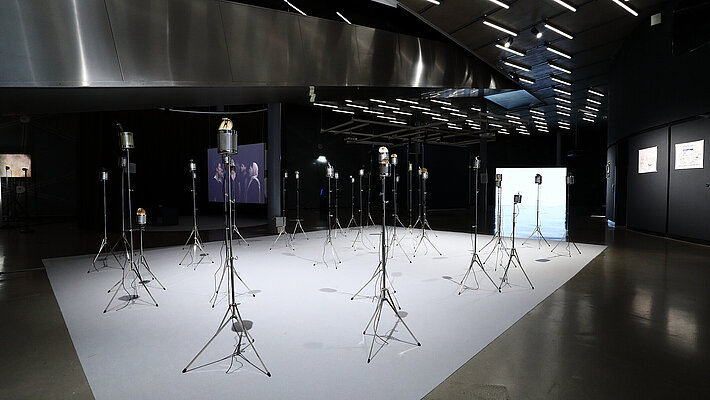|
|
|
|
|
|
Graz, 26.02.2025
The title of the exhibition, which deals with the power of the voice, is based on the performance Freeing the Voice, an early work by Marina Abramović. This performance was groundbreaking for both performance and body art in its exploration and transgression of boundaries. The show, which comprises a total of 27 artistic positions, is curated by the Slovenian curator and former director of MSU Zagreb Zdenka Badovinac, who is focusing on video installations.
|
|

“Freeing the Voices” opens on February 27 at Kunsthaus Graz. Exhibition view of "Curtain Poetry" from Babi Badalov (2025), photo: Kunsthaus Graz/J.J. Kucek
|
|
|
|
|
|
|
|
|
|
|
|
The exhibition Freeing the Voices begins with one voice, the scream of Marina Abramović – that is to say, one human being that grows during the exhibition into a multitude of mainly human voices, and ends with the voice of the midge in the work of Tao G. Vrhovec Sambolec. We do not hear the voice of the midge with our ears; its presence is in our radical listening. Listening is not the same as hearing. Its specificity lies in our attention and awareness of ourselves and others, human and non-human beings, and things.
Why is an exhibition about the voice so important today?The world we live in has become completely untuned. The multiplicity of crises and genocidal wars, together with the loss of the common space of bodies resonating with each other, have created a sense of suffocation and panic. On top of all this, a culture of silence has taken hold around us, the space for free speech is shrinking, and there are growing calls for a culture of cancellation. But this silencing, this censorship, is not the only means of control. We are subjected to a noise of information that overwhelms us even more. A noise in which the sense that would bind us together as a social body is silenced.
In the face of all this, it is no longer enough to simply conclude that we are not speaking with our own voice, that there is always the voice of the master behind it. It is time for action, even if it is as inarticulate as shouting or murmuring.
|
|

The "Singing Revolution" referes to the peaceful mass protests in Estonia, Latvia and Lithuania calling for independence from the Soviet Union between 1988 and 1991. Anna Jermolewa assembles a choir in each of the Baltic capitals to sing some of the movements` liberation songs, photo: Kunsthaus Graz/J.J. Kucek
|
|
|
|
|
|
|
|
|
|
|
|
Although there is no such thing as our own authentic voice, the liberation of our individual and collective voice is the horizon of the works exhibited. Liberating our voices does not mean finding a selfhood with which our voice corresponds perfectly. What we really liberate with the voice is our relationship to the world. The artworks in this exhibition attempt to decolonise the different voices of particular traditions, nations and their communities and landscapes, the voices of women, people of colour, people from the edges of Europe, and the voices of our individual bodies. In our case, liberating voices means breathing, shouting, poetising, singing, speaking and murmuring.
The works exhibited also raise awareness of the crisis of modernity and its rational constructs. Their language transcends universal concepts and embodies particular experiences and knowledge. A voice is always a particular voice. And there is no voice that cannot be heard, so the liberated voices are only the voices that are heard. And listening has the power to heal, to connect, and to resist.
With works by Noor Abed, Marina Abramović, Lawrence Abu Hamdan, Babi Badalov, selma banich, CO2... a couple of artists, VALIE EXPORT, Farhad Farzali, Essa Grayeb, Ida Hiršenfelder, Saodat Ismailova, Anna Jermolaewa, Mikhail Karikis, Anton Kats, Belinda Kazeem-Kamiński, Brandon LaBelle & Octavio Camargo, Katalin Ladik, Lucia Nimcová, Lala Raščić, Antoni Rayzhekov, Gerhard Rühm, Selma Selman, ŠKART & NONpractical Women, Mladen Stilinović, Irena Z. Tomažin, Nora Turato, Tao G. Vrhovec Sambolec.
|
|

This work by Antoni Rayzhekov brings together voices from interview passages of key political figures in Bulgaria. The artist has removed all spoken words from the interviews and kept in only the sounds surrounding them: gasps, sighs, unarticulated sounds of unease, photo: Kunsthaus Graz/J.J. Kucek
|
|
|
|
|
|
|
|
|
|
|
|
|
______________________
FREEING THE VOICES
Opening: 27.02.2025, 6 pm
Duration: 28.02.2025–24.08.2025
Curated by Zdenka Badovinac
Curatorial assistance: Martin Grabner
www.kunsthausgraz.at
You can download the press release and exhibition views here:
FREEING THE VOICES
______________________
We look forward to your report and will be happy to answer any questions you may have!
Daniela Teuschler
+43/664/8017-9214, daniela.teuschler@museum-joanneum.at
Stephanie Liebmann
+43/664/8017-9213, stephanie.liebmann@museum-joanneum.at
Eva Sappl
+43/699/1780-9002, eva.sappl@museum-joanneum.at
|
|
|
|
|
|
|
|